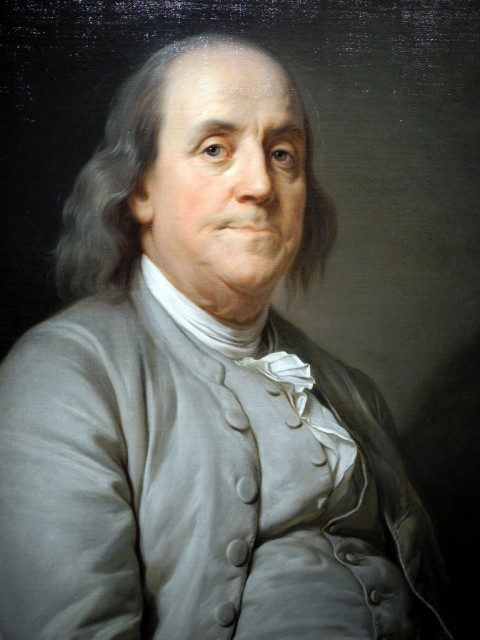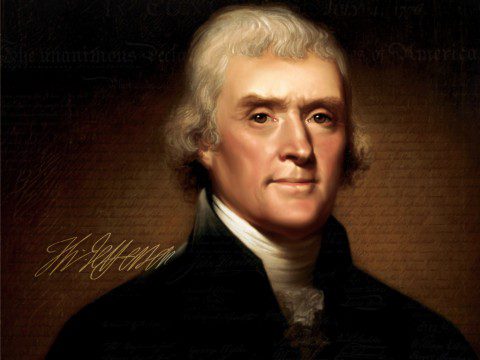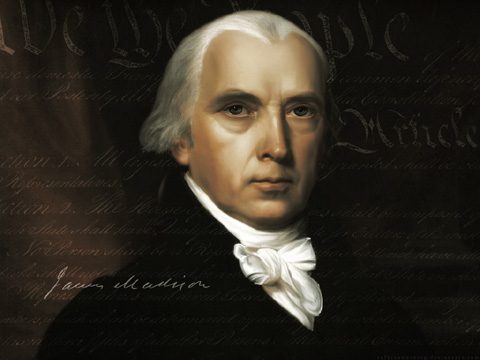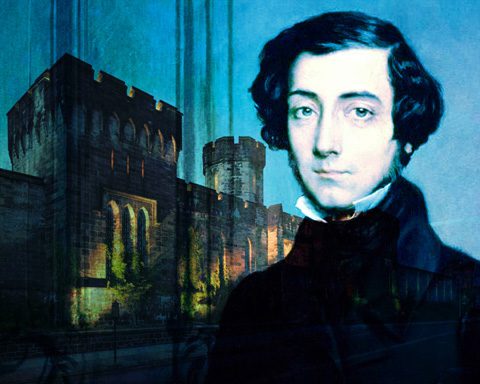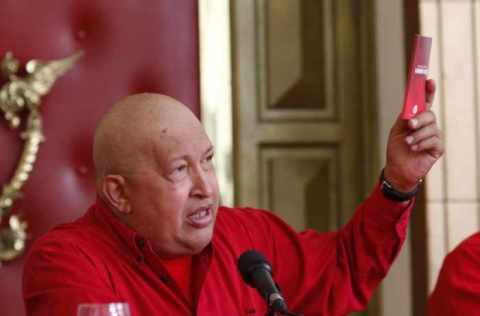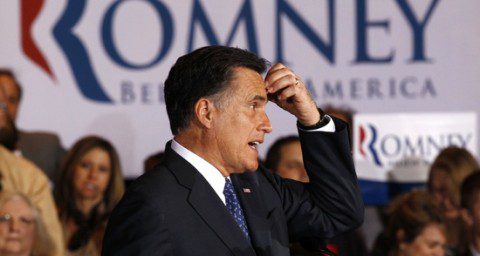Were America’s founding fathers influenced by Jesus Christ? Rather than debate the topic, why not just look into their personal journals? What did they say?
Christopher Columbus in his Book of Prophecies:
It was the Lord who put into my mind (I could feel His hand upon me) the fact that it would be possible to sail from here to the Indies….
There was no question that the inspiration was from the Holy Spirit, because he comforted me with rays of marvelous illumination from the Holy Scriptures … encouraging me continually to press forward, and without ceasing for a moment they now encourage me to make haste.
In a letter written in 1493 to Spain’s General Treasurer Gabriel Sanchez, Columbus wrote:
That which the unaided intellect of man could not compass, the spirit of God has granted to human exertions, for God is wont to hear the prayers of His servants who love His precepts even to the performance of apparent impossibilities. Therefore, let the king and queen, our princes and their most happy kingdoms, and all the other provinces of Christendom, render thanks to our Lord and Saviour Jesus Christ.
In June of 1630, ten years after the Pilgrims founded the Plymouth Colony, Gov. John Winthrop landed in Massachusetts Bay with 700 people in 11 ships, thus beginning the Great Migration, which lasted 16 years and saw more than 20,000 Puritans embark for New England. In a sermon aboard the ship Arbella before disembarking on the shores of New England, Winthrop said:
We are a Company, professing ourselves fellow members of Christ, and thus we ought to account ourselves knit together by this bond of love….
Thus stands the cause between God and us: we are entered into covenant with Him for this work. We have taken out a Commission, the Lord hath given us leave to draw our own articles….
We must hold a familiar commerce together in each other in all meekness, gentleness, patience, and liberality. We must delight in each other, make one another’s condition our own, rejoice together, mourn together, labor and suffer together, always having before our eyes our Commission and Community in this work, as members of the same body….
We shall find that the God of Israel is among us, when ten of us shall be able to resist a thousand of our enemies, when He shall make us a praise and glory, that men of succeeding plantations shall say, “The Lord make it like that of New England.”
For we must Consider that we shall be as a City upon a Hill, the eyes of all people are upon us.
Benjamin Franklin in Poor Richard’s Almanac offered his personal version of the Lord’s Prayer:
Heavenly Father, May all revere Thee, And become They dutiful children and faithful subjects. May thy Laws be obeyed on earth as perfectly as they are in Heaven. Provide for us this day as Thou hast hitherto daily done. Forgive us our trespasses, and enable us likewise to forgive those that offended us. Keep us out of temptation and deliver us from Evil.
In a 1787 speech to the Constitutional Convention:
God governs in the affairs of man. And if a sparrow cannot fall to the ground without his notice, is it probable that an empire can rise without His aid? We have been assured in the Sacred Writings that except the Lord build the house, they labor in vain that build it. I firmly believe this. I also believe that, without His concurring aid, we shall succeed in this political building no better than the builders of Babel.
In comments on the Great Awakening – a religious revival that swept early America, led by Jonathan Edwards:
It was wonderful to see the change soon made in the manners of our inhabitants. From being thoughtless or indifferent about religion, it seemed as if all the world were growing religious, so that one could not walk thro’ the town in an evening without hearing psalms sung in different families of every street.
On matters of education, in 1750 Franklin wrote to Dr. Samuel Johnson, the first president of King’s College (now Columbia University):
I think with you, that nothing is of more importance for the public weal, than to form and train up youth in wisdom and virtue…. I think also, general virtue is more probably to be expected and obtained from the education of youth, than from the exhortation of adult persons; bad habits and vices of the mind being, like diseases of the body, more easily prevented than cured.
I think, moreover, that talents for the education of youth are the gift of God; and that he on whom they are bestowed, whenever a way is opened for the use of them, is as strongly called as if heard a voice from heaven.
Franklin wrote in his Autobiography this prayer that he said he prayed every day:
O powerful goodness! Bountiful Father! Merciful Guide! Increase in me that wisdom which discovers my truest interest. Strengthen my resolution to perform what that wisdom dictates. Accept my kind offices to thy other children as the only return in my power for thy continual favors to me.
It has been alleged that he was an atheist. He wrote in his Autobiography:
I never doubted, for instance, the existence of the Deity; that he made the world, and governed it by his Providence; that the most acceptable service of God was the doing good to man; that our souls are immortal; and that all crime will be punished, and virtue rewarded, either here or hereafter.
In July 1776, Franklin was appointed to a committee to draft a seal for the newly formed United States. He proposed:
Moses lifting up his wand, and dividing the red sea, and pharaoh in his chariot overwhelmed with the waters. This motto: “Rebellion to tyrants is obedience to God.”
On March 9, 1790 in a letter to Ezra Stiles, President of Yale University, he wrote:
As to Jesus of Nazareth, my Opinion of whom you particularly desire, I think the System of Morals and his Religion, as he left them to us, is the best the World ever saw, or is likely to see.
In 1787 Franklin wrote in a letter:
Only a virtuous people are capable of freedom. As nations become corrupt and vicious, they have more need of masters.
At the Constitutional Convention in 1787, Franklin, disturbed by the bitter debates among the delegates, said in a speech to the convention:
I have lived, Sir, a long time, and the longer I live, the more convincing proofs I see of this truth–that God Governs in the affairs of men….
We have been assured, Sir, in the Sacred Writings, that “except the Lord build the House, they labor in vain that build it.”…
I therefore beg leave to move–that henceforth prayers imploring the assistance of Heaven, and its blessing on our deliberations, be held in this Assembly every morning before we proceed to business, and that one or more of the clergy of this city be requested to officiate in that service.
Prayer has opened both houses of Congress ever since.
George Washington as Commander-in-Chief of the Continental Army often prayed and fasted, invoking God’s protection and providence during the entire War of Independence. He appointed chaplains for every regiment. In 1789, at his inauguration as the first President of the United States, Washington said:
Such being the impressions under which I have, in obedience to the public summons, repaired to the present station, it would be peculiarly improper to omit, in this first official act, my fervent supplications to the Almighty Being who rules over the universe, who presides in the councils of nations and whose providential aids can supply every human defect, that His benediction may consecrate to the liberties and happiness of the people of the United States a Government instituted by themselves for these essential purposes; and may enable every instrument employed in its administration to execute with success, the functions allotted to his charge….
No people can be bound to acknowledge and adore the Invisible Hand which conducts the affairs of men more than the people of the United States.
Every step by which they have advanced to the character of an independent nation seems to have been distinguished by some token of providential agency….
On Oct. 3, 1789, Washington issued a National Day of Thanksgiving Proclamation in which he stated:
Whereas it is the duty of all nations to acknowledge the providence of Almighty God, to obey His will, to be grateful for his benefits, and humbly to implore His protection and favor ….
Now, therefore, I do recommend and assign Thursday, the twenty-sixth day of November next, to be devoted by the people of these United States …. that we then may all unite unto him our sincere and humble thanks for His kind care and protection of the people of this country previous to their becoming a nation; for the signal and manifold mercies and the favorable interpositions of His providence in the course and conclusion of the late war; for the great degree of tranquility, union, and plenty which we have since enjoyed; for the peaceable and rational manner in which we have been enabled to establish constitutions of government for our safety and happiness, and particularly the national one now lately instituted; for the civil and religious liberty with which we are blessed….
And also that we may then unite in most humbly offering our prayers and supplications to the great Lord and Ruler of Nations, and beseech Him to pardon our national and other transgressions, to enable us all, whether in public or private stations, to perform our several and relative duties properly and punctually, to render our national government a blessing to all the People, by constantly being a government of wise, just and constitutional laws, discreetly and faithfully executed and obeyed, to protect and guide all Sovereigns and Nations (especially such as have shown kindness unto us) and to bless them with good government, peace, and concord, to promote the knowledge and practice of the true religion and virtue, and the increase of science among them and Us, and generally to grant unto all Mankind such a degree of temporal prosperity as He alone knows to be best.
On June 8, 1783, in a letter to the governors of the states, he wrote:
I now make it my earnest prayer the God would have you and the State over which you preside, in His holy protection, that he would incline the hearts of the citizens to cultivate a spirit of subordination and obedience to government; to entertain a brotherly affection and love for one another, for their fellow citizens of the United States at large, and particularly for their brethren who have served in the field; and, finally, that he would be most graciously pleased to dispose us all to do justice, to love mercy, and to demean ourselves with that charity, humility, and pacific temper of mind, which were the characteristics of the Divine Author of our blessed religion, and without an humble imitation of whose example in these things we can never hope to be a happy nation.
One merely has to read the prayers that Washington wrote in his own personal prayer book to understand how deeply he relied on God. In one, he wrote:
I have sinned and done very wickedly, be merciful to me, O God, and pardon me for Jesus Christ sake…. Thou gavest Thy Son to die for me; and has given me assurance of salvation, upon my repentance and sincerely endeavoring to conform my life to His holy precepts and example.
John Adams, the first vice president of the United States and America’s second president wrote in his diary on July 26, 1796:
The Christian religion is above all the Religions that ever prevailed or existed in ancient or modern times, the religion of Wisdom, Virtue, Equity, and Humanity. Let the Blackguard Paine say what he will; it is Resignation to God, it is Goodness itself to Man.
On December 25, 1813 in a letter to Thomas Jefferson:
I have examined all religions, as well as my narrow sphere, my straightened means, and my busy life, would allow; and the result is that the Bible is the best Book in the world. It contains more philosophy than all the libraries I have seen.
On November 4, 1816 in a letter to Thomas Jefferson:
The Ten Commandments and the Sermon on the Mount contain my religion.
In a letter to Thomas Jefferson on June 28, 1813:
I will avow that I then believed, and now believe, that those general principles of Christianity are as eternal and immutable as the existence and attributes of God; and that those principles of liberty are as unalterable as human nature.
Twenty times in the course of my late reading have I been on the point of breaking out, “This would be the best of all possible worlds, if there were no religion at all!!!” But in this exclamation I would have been as fanatical as Bryant or Cleverly. Without religion, this world would be something not fit to be mentioned in polite company, I mean hell.
Jesus is benevolence personified, an example for all men… The Christian religion, in its primitive purity and simplicity, I have entertained for more than sixty years. It is the religion of reason, equity, and love; it is the religion of the head and the heart.
Thomas Jefferson in America’s God and Country Encyclopedia of Quotations, edited by newspaper columnist William J. Federer is quoted frequently. In the 1781, Query XVIII of Jefferson’s “Notes on that State of Virginia” he notes that:
God who gave us life gave us liberty. And can the liberties of a nation be thought secure when we have removed their only firm basis, a conviction in the minds of the people that these liberties are of the Gift of God? That they are not to be violated but with His wrath? Indeed, I tremble for my country when I reflect that God is just; that His justice cannot sleep forever.
On April 21, 1803 in a letter to Dr. Benjamin, Jefferson wrote:
My views…are the result of a life of inquiry and reflection, and very different from the anti-christian system imputed to me by those who know nothing of my opinions. To the corruptions of Christianity I am, indeed, opposed; but not to the genuine precepts of Jesus himself. I am a Christian in the only sense in which he wished any one to be; sincerely attached to his doctrines in preference to all others…
The doctrines of Jesus are simple, and tend to all the happiness of man.
Of all the systems of morality, ancient or modern which have come under my observation, none appears to me so pure as that of Jesus….I am a real Christian, that is to say, a disciple of the doctrines of Jesus.
James Madison, the fourth president of the United States, on June 20, 1785, wrote:
Religion is the basis and Foundation of Government.
In a manuscript on the Gospels and the Acts of the Apostles:
It is not the talking but the walking and working person that is the true Christian.
In his March 4, 1809 Inaugural Address:
We have all been encouraged to feel in the guardianship and guidance of that Almighty Being, whose power regulates the destiny of nations.
In 1778 statements to the General Assembly of the State of Virginia:
We have staked the whole future of American civilization, not upon the power of government, far from it. We’ve staked the future of all our political institutions upon our capacity…to sustain ourselves according to the Ten Commandments of God.
Noah Webster, another great American whose godly influence was felt by millions of children, is known for his blue-backed speller which taught millions to read and spell. In 1828, Webster completed his American Dictionary of the English Language. He stated:
Education is useless without the Bible.
God’s Word, contained in the Bible, has furnished all necessary rules to direct our conduct.
He also wrote:
In my view, the Christian religion is the most important and one of the first things in which all children, under a free government ought to be instructed. … No truth is more evident to my mind than that the Christian religion must be the basis of any government intended to secure the rights and privileges of a free people.
Alexis de Tocqueville, the French historian, traveled throughout America in the early 1830s and wrote his observations, including:
In the United States the sovereign authority is religious, … [T]here is no country in the world where the Christian religion retains a greater influence over the souls of men than in America, and there can be no greater proof of its utility and of its conformity to human nature than that its influence is powerfully felt over the most enlightened and free nation of the earth….
The safeguard of morality is religion, and morality is the best security of law as well as the surest pledge of freedom.
The Americans combine the notions of Christianity and of liberty so intimately in their minds, that it is impossible to make them conceive the one without the other.
America is great because America is good, and if America ever ceases to be good, America will cease to be great.



